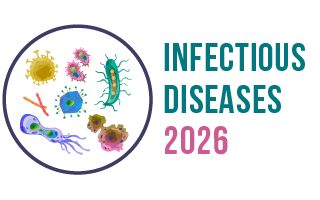4th International Conference on
Infectious Diseases
September 09-10, 2026 | Barcelona, Spain

Address: Avinguda Del Maresme 78 Ronda De Dalt Exit 15, 08940 Comella de Llobregat, Barcelona, Spain
Infectious Diseases 2026

Vita International Health Agency, UK
Abstract:
Tuberculosis (TB) continues to be a serious problem for public health due to the high prevalence, incidence and mortality rates caused annually in the communities. The study aim is to identify and analyse the risk factors of LTFU TB treatment in patients treated for TB in Sanatorium Hospital in Luanda. Moreover, it is known that lack of treatment adherence increases the risk of drug resistance, relapse, and mortality rate.Methods: We carried out a prospective cohort study with 113 patients, who started TB treatment in Sanatorium Hospital in Luanda between August first, 2018 and September, 30th 2019. And also a qualitative approach was used to explore information about factors that influence patients to LTFU TB treatment with 69 participants.Results: A total of 113 patients were included. Sixty-seven (59.3%) were males and 46 (40.7%) females.When we analysed the variables associated with LTFU in the univariate analysis, it was observed that men were more likely to be LTFU than women (74.1% vs 25.9%, p=0.03).Participants who were cured ate more often three meals per day (breakfast, lunch, AND dinner) than those who were LTFU (65.8% vs. 33.3%, p=0.002).In the multivariate analysis, we observed that a severe TB presentation at the moment of diagnosis and eating less than 3 times per day were significantly associated with LTFU TB treatment (OR 9.24, 95% CI 2.18-39.04, p=0.006) and (OR 5.96, 95% CI 1.66-21.41, p=0.006). When we performed a qualitative study with individual interviews and focus groups, we found five main causes that lead to LTFU TB treatment: healthcare barriers, drug related problems, religious beliefs and sociodemographic variables such as lack of family support, economic factors, relocation and distance.Conclusion: In the cohort of patients diagnosed with tuberculosis and treated with antituberculous drugs in the Sanatorium Hospital of Luanda we obtained cure rates of 67.3% and an abandonment rate of 24%Key words: Tuberculosis, LFTU TB treatment, patient, Sanatorium Hospital in Luanda, Angola.
Biography:
Domingos Vita is Scientist and International Consultant in Public Health, graduated with a PhD in Medicine (Tuberculosis) at University of Autonomo de Barcelona in Spain, Master’s degree in Health Sciences at University of Roehampton in London and participated in Masters course on control of Infectious diseases at London School of Hygiene and Tropical Medicine and also graduated with a BSc (Hons) Degree in Public Health at University of East London. Found of Vita International Health Agency, Professor at ISPTEC, ISTM-Faculty of Medicine in Angola and GEETA University in India. Scientist and International Consultant in Public Health, graduated with a PhD in Medicine (Tuberculosis) at University of Autonomo de Barcelona in Spain, Master’s degree in Health Sciences at University of Roehampton in London and I participated in Masters course on control of Infectious diseases at London School of Hygiene and Tropical Medicine and also I graduated with a BSc (Hons) Degree in Public Health at University of East London.
